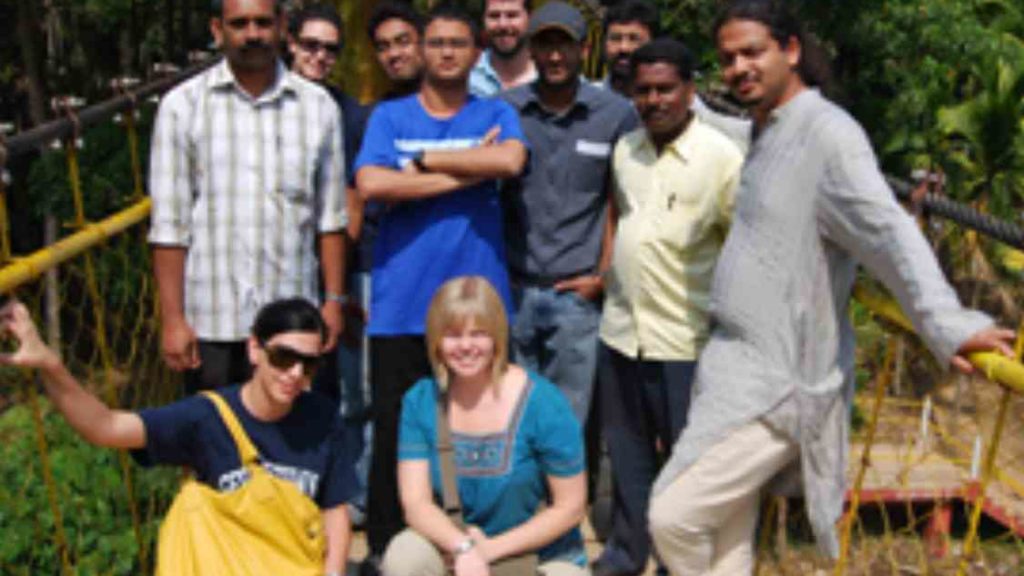Service Learning Trip to India

Georgetown students meet families of Indian Migrant workers in Qatar
Since January 2008, twelve students had been involved in a research exercise in Qatar to identify the savings, investment and remittance trends of migrants from Kerala. In an innovative twist, the students extended their research beyond the workers to include the families of the migrants in order to study the positive and negative effects of migration on the household. Equipped with the lessons learned from a year-long series of lectures, research activities and other activities, five students and four university staff members boarded a flight to India to complete the final phase of their research on migration from Kerala to Qatar.
Traditional research on migration has tended to be limited to a single variable – either the household or the migrant. This traditional model doesn’t accurately account for the relationship between the worker and his family back home.
So, the students and Georgetown University professor Ganesh Seshan developed a research program to identify and understand the complexities of the migration phenomena by studying both the migrant and the household variables. This allows for a more comprehensive depiction of the migrant experience, which typically affects the entire household. “The research was an eye-opener for everyone, including myself, as it provided us with an opportunity to meet the family members of migrant workers and learn about their stories, and get an insight into their lives. This experience was built on our previous interactions with migrants in Qatar enabling us to establish a connection, personally and academically, with our interviewees. It added a lot of value to our research and we hope we can continue further,” said Sehshan.
Among other things, the survey addressed issues relating to the cost of living in Qatar, the level of remittances and their uses, savings and investments by the migrant household, communication between the migrant and the families abroad and the mental health of both parties.
On the first day, the students attended a workshop conducted by Janathan Aiyar from the Indian Statistical Institution, an organization known for conducting large research surveys in the region. Aiyar advised the students on the cultural dimensions of field research in India and helped ease their transition as the students embarked on their first set of interviews in Kerala. The second day, students boarded an early train to Kollam where they conducted six interviews before getting back to Trivandrum. On the third day, the students were back in the field in Trivandrum, navigating the roads and traffic to visit more households and meet more families.
The students spent next day at the hotel, reviewing the questionnaires and tabulating data collected from the interviews in Trivandrum and Kerala. The process involved analyzing all the questionnaires, and inputting the data into computers to facilitate the ability to identify trends.
In the afternoon, the students met with Dr. Irudaya Rajan and Dr. K. C. Zachariah from the Center for Development Studies, who facilitated the research exercise in India.
While the data is still being tabulated and analyzed, the students have identified the following trends from their research:
- Families have a dependency on migrant income, regardless of their ability to access employment or income generation opportunities in India
- Families have large levels of indebtedness, including the phenomenon of soliciting for loans to repay back debts
- There is a lack of priority for paying back loans
- Families and migrants have easy access to loans from formal banks or informal sources
- Household dependency on remittance money for the general household consumption only, as opposed to investments and long-term financial planning.
- Lack of financial planning from the migrant as well as the household
- Flawed recruitment process through agents and sub-agents results in exploitation of labor in the migration process
Aakash Jayaprakash (SFS ’11) found the field research trip a significant personal and academic experience. “I was excited to have the opportunity to be involved in this research, as it exposed us to realities that we thought we already knew. It’s one thing to hear about these stories, but another thing to experience the struggles or successes of these migrants and their households, meeting their families, and speaking to their loved ones,” he said.
The research team hopes that the findings of this study would be valuable to policymakers and researchers in Kerala who are involved in migration issues, as well as being helpful to potential migrants in making a more informed decision on the migration process.